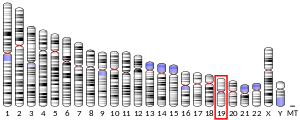MEX3D
Mex-3 homolog D (C. elegans), also known as MEX3D, is a protein that in humans is encoded by the MEX3D gene.[5][6]
Function
MEX3D is an RNA binding protein that interacts with AU-rich elements of Bcl-2. Upon binding, MEX3D has a negative regulatory action on Bcl-2 expression at the posttranscriptional level.[6]
Structure
MEX3 proteins contain two N-terminal heterogeneous nuclear ribonucleoprotein K homology motifs ( KH domain ) and a RING domain at the C-terminus.[6]
gollark: This is not a good thing.
gollark: … stop
gollark: "Thought"
gollark: *disagrees*
gollark: What happened to the "informal poll" thing?
References
- GRCh38: Ensembl release 89: ENSG00000181588 - Ensembl, May 2017
- GRCm38: Ensembl release 89: ENSMUSG00000048696 - Ensembl, May 2017
- "Human PubMed Reference:". National Center for Biotechnology Information, U.S. National Library of Medicine.
- "Mouse PubMed Reference:". National Center for Biotechnology Information, U.S. National Library of Medicine.
- "Entrez Gene: mex-3 homolog D (C. elegans)".
- Donnini M, Lapucci A, Papucci L, Witort E, Jacquier A, Brewer G, Nicolin A, Capaccioli S, Schiavone N (May 2004). "Identification of TINO: a new evolutionarily conserved BCL-2 AU-rich element RNA-binding protein". J. Biol. Chem. 279 (19): 20154–66. doi:10.1074/jbc.M314071200. PMID 14769789.
Further reading
- Strausberg RL, Feingold EA, Grouse LH, et al. (2002). "Generation and initial analysis of more than 15,000 full-length human and mouse cDNA sequences". Proc. Natl. Acad. Sci. U.S.A. 99 (26): 16899–903. doi:10.1073/pnas.242603899. PMC 139241. PMID 12477932.
- Gerhard DS, Wagner L, Feingold EA, et al. (2004). "The status, quality, and expansion of the NIH full-length cDNA project: the Mammalian Gene Collection (MGC)". Genome Res. 14 (10B): 2121–7. doi:10.1101/gr.2596504. PMC 528928. PMID 15489334.
- Buchet-Poyau K, Courchet J, Le Hir H, et al. (2007). "Identification and characterization of human Mex-3 proteins, a novel family of evolutionarily conserved RNA-binding proteins differentially localized to processing bodies". Nucleic Acids Res. 35 (4): 1289–300. doi:10.1093/nar/gkm016. PMC 1851655. PMID 17267406.
This article is issued from Wikipedia. The text is licensed under Creative Commons - Attribution - Sharealike. Additional terms may apply for the media files.



